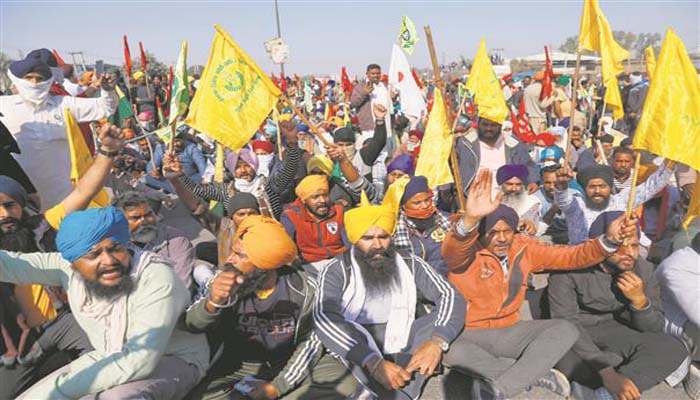New Delhi, December 08:
The Delhi Police on Monday said that they will take strict legal action against persons who would try to disrupt movement of traffic or people or forcefully close shops during the Tuesday’s Bharat Bandh, as nearly 4,000 traffic personnel and thousands of security personnel will be deployed on the borders and the city roads to regulate the traffic and avoid any untoward incidents.
Delhi Police commissioner SN Shrivastava said Section 144 of the Code of Criminal procedure (CrPC), prohibiting gathering of people, is already in place in the entire city.
“Our maximum strength will be on roads and an elaborate traffic and security arrangement has been put in place for the nationwide strike. Nobody will be allowed to take the law in his or her hands,” said Shrivastava.
Thousands of farmers have gathered on Delhi’s borders to protest against the three farm laws enacted in September and have given a call for a nationwide bandh on Tuesday.
In a statement issued on Monday, the city police have appealed to everyone not to disrupt the life of common citizens and residents of Delhi during the strike.
As the city police have been receiving inputs that the farmers protesting at various borders in outer and east Delhi may attempt to block more borders or would try to cross over into Delhi, a “contingency plan” has been prepared to avoid traffic chaos and inconvenience to commuters. Of the 4,000 traffic personnel, a majority of them will be deployed on the borders that are either closed or affected due to the farmers’ protest.
On Monday evening, senior police officers held a briefing of all the traffic personnel who will be on duty Tuesday and explained the contingency plans. All the traffic circle inspectors were informed about their place of deployment and given a list of the alternative borders and routes through which the movement of vehicles between Delhi-Haryana and Delhi-Uttar Pradesh will be passed if the main borders are blocked by the protesting farmers of workers of the political parties and various unions that have extended support to the nationwide strike, said a senior traffic police officer.
“Our traffic personnel will guide the motorists as per the situation. There will be alternative routes to regulate the movement of vehicles. As maximum traffic congestion is likely to be in the areas bordering Haryana and Uttar Pradesh, our deployment will mostly be in such areas. We will be regularly posting updates regarding the traffic situation on social media,” said special commissioner of police (traffic) Taj Hassan.
Seven borders that are completely closed due to the farmers’ protest are Singhu, Tikri, Auchandi, Jharoda, Piao Maniyari, and Mangesh in outer and south-western parts of the city and Chilla border, connecting Delhi and Noida, in east Delhi. Apart from these points, the Delhi-Meerut expressway at Ghazipur-Ghaziabad (UP Gate) border is closed for vehicles coming to Delhi from Ghaziabad side, while the opposite carriageway through which vehicles move towards Ghaziabad is open. The service road of NH-24 at the UP gate border is also closed as the protesting farmers have occupied it for the past 10 days.
Traffic police officials said that due to the closure of the seven borders, the movement of vehicles between Delhi and Haryana is being managed through Lampur, Safiabad, Saboli, Dhansa, Daurala, Kapashera, Rajokri NH 8, Bijwasan, Bajghera, Palam Vihar and Dundahera.
“Similarly, motorists travelling between Delhi and UP are advised to take Apsara, Bhopra, Anand Vihar, Kalindi Kunj, DND, New Ashok Nagar, Kondli and Dallupra to avoid traffic chaos. In case, some of these open borders are also disrupted, there are many other points through which the vehicles can move from one city to another,” said another traffic police officer.
Senior police officers said all patrol vehicles will be pressed into service. In New Delhi district, security has been beefed up at the residence of senior ministers, including the agriculture minister, and at important buildings such as Krishi Bhawan, Vigyan Bhawan and the Parliament.
Senior officials said drone cameras will be used to keep surveillance on the protesting farmers and those who will be participating in the strike. The offices of the various political parties that are supporting the strike are also being monitored.
“We are having talks with the representatives of the political parties and various unions and telling them that no gathering or people or protest is allowed in the city as per the Covid-19 guidelines. We are also holding meetings with RWAs and market associations,” said an officer.




